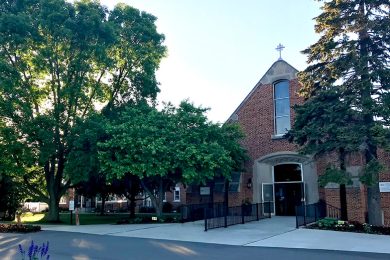Amid the ongoing challenges posed by the coronavirus pandemic, the Minnesota Catholic Conference worked to help pass legislation at the State Capitol this session to protect the poor and vulnerable while also staving off initiatives to legalize recreational marijuana and physician-assisted suicide.
Legislators, who began meeting in January, needed a special session in June to reach agreement on the state’s next two-year budget. Along the way, they passed a one-time cash grant stimulus of $435 for low-income families and a cost-of-living adjustment to the Minnesota Family Investment Program (MFIP), which provides basic economic assistance for children and their working parents, said Jason Adkins, MCC executive director.
In 2019, MCC, the public policy voice of the Catholic Church in Minnesota, worked with partners, including the Joint Religious Legislative Coalition, to increase the MFIP cash grant to families by $100 — the first increase in the monthly grant in more than 30 years. The cost-of-living adjustment will assist families to cope with rising costs.
“You can’t overcome poverty in 2021 with 2012 or 2015 dollars,” Adkins said. “And already we’re talking about inflationary pressures that make it more expensive to fill up your car, to pay your bills, etc.”
MCC opposed efforts this session to legalize recreational marijuana use. A bill that would have created a commercial recreational marijuana industry in the state passed the House but failed in the Senate. Addressing participants at this year’s Catholics at the Capitol event in April, Bishop Andrew Cozzens of the Archdiocese of St. Paul and Minneapolis said such legalization would introduce another vice into society that would lower public morality and harm people, especially young people.
“There was just a story in the newspaper about a conviction for a traffic fatality in the Twin Cities involving someone high on marijuana,” Adkins said. “We just need to tell the story of what’s happened in other places where this has been legalized and why it’s a problem in our community. Colorado, the first state to legalize recreational marijuana, just passed a huge reform bill to rein in that whole industry.”
Proponents of the marijuana proposal argue that it would help to address racial disparities in the criminal justice system. Adkins, however, said this is the wrong approach to the problem. “There are criminal justice concerns related to marijuana, but those can — and should — be dealt with separately.”
MCC also continued to oppose efforts to legalize physician-assisted suicide — an issue that has surfaced every year at the Legislature since 2015. However, it has never received a legislative committee vote. Still, opponents of assisted suicide must remain vigilant, Adkins said.
“In conjunction with our partners at the Minnesota Alliance for Ethical Healthcare, we continue to make the case that we should be advancing ethical care, and better care, and not killing people,” he said.
More people are understanding the threat posed by the potential legalization of physician-assisted suicide, Adkins noted.
“I think they’re connecting the dots because of the opioid crisis. They’re connecting the dots because of COVID — the way in which we’ve made so many sacrifices to preserve lives,” he said. “People are starting to recognize that protecting the autonomy of some people endangers the well-being of the rest of us. In other words, the COVID crisis helped us rediscover the common good a little bit more in the health care sphere, and the opioid crisis shows us that we shouldn’t always trust pharmaceutical companies and insurance companies with the public well-being.
“We’re continuing to do the ongoing work of education through a new webinar series that you can find on the Alliance website [ethicalcaremn.org],” he added, “and we will continue to make the good case about why [physician-assisted suicide] isn’t the right path. That message is hitting home at the Capitol.”
Among other issues MCC focused on this session:
• Educational choice — Helping children and their families to access schools that best serve their needs has been an MCC priority for many years. Although efforts to create education savings accounts or tuition tax credits ultimately failed to pass the full Legislature, Adkins said he is hopeful for the future because “the Senate passed the most comprehensive school choice legislation in our state’s history” — education savings accounts for all families with household incomes under $150,000.
“That’s a huge, historic win and an incredible development,” he said. “That’s how we empower families to give children the best education they can get that’s consistent with their values. And that has to be our framework going forward.”
• Driver’s licenses for undocumented immigrants — Although this measure, which MCC supports, fell short again this year, there was progress on the educational front, Adkins said.
“People are realizing that although there needs to be comprehensive immigration reform at the federal level, it’s the state’s responsibility to create safe roads,” he said. “That’s what this legislation is about — creating safe roads and not separating families because of a traffic violation. That message is resonating with more people.”
• Medical Assistance — Postpartum coverage under Medical Assistance was extended from 60 days to 12 months. “This helps to ensure the physical and psychological well-being of moms, which in turn supports families and their newborns,” Adkins said.
• Driver’s license suspension reform — The penalty for unpaid fines and fees for minor traffic violations will now entail a civil collections process rather than suspension of a person’s driver’s license. “So some of the things that have led to unfortunate police stops and stops that have created conflict, hopefully those will be diffused” with passage of this legislation, Adkins said.
• Emergency services — The Legislature passed additional funding of $6 million per year to help meet the needs of those experiencing homelessness.
Looking ahead to the 2022 legislative session, MCC will be following any amendment efforts that seek to further constitutionalize a right to abortion or limit religious freedoms, Adkins said. It will continue to oppose efforts to legalize recreational use of marijuana, and it will promote palliative care options as an ethical alternative to physician-assisted suicide. It also will oppose any measures that would undermine school choice efforts or threaten parental rights in education.
The period between state legislative sessions is often the best time to reach out to local lawmakers on such issues, Adkins said.
“These times of the year are becoming more and more important to have good, robust conversations with legislators outside of the charged political environment of a session,” he said. “We need to cultivate these relationships on an individual level but also on a community level. Consider inviting them to your parish festival and talking to them about issues you care about.”
Stay connected: The Catholic Advocacy Network is an initiative of the Minnesota Catholic Conference. The non-partisan network — for which you can sign up at www.mncatholic.org — alerts Catholics via email and/or text to important state and federal legislative activity about which they can contact lawmakers with a single click. MCC also sends e-newsletters with ways to learn about the Church’s social ministry as well as advocating for life, dignity and the common good.
Photo: The interior dome of the Minnesota Capitol in St. Paul. (Dianne Towalski / The Central Minnesota Catholic)






















